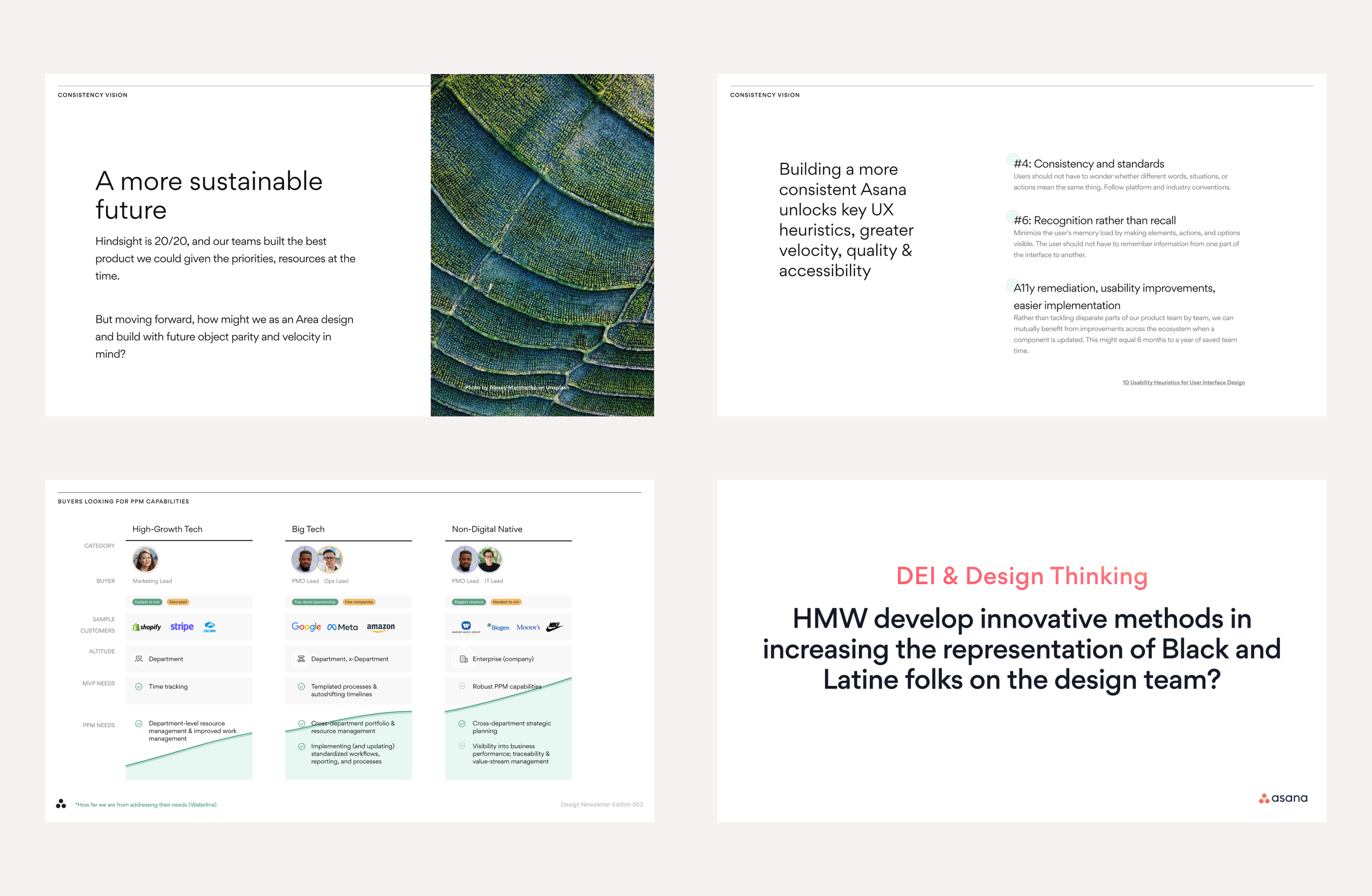Leading by design
As a Product Design Director at Asana, I designed creative safe spaces, talented teams and elevated consistency & craft within our core product areas.
CHALLENGE
Since going public in 2020, Asana is at an inflection point. It’s R&D team has doubled in size over 2 years, and with an increased investment in serving enterprise customers, its processes and designs need to scale.
SOLUTION
As a design leader, I partnered with my cross-functional peers, operations teams and leadership org to increase product quality and innovation, optimize our process for agility and form/staff strategic teams with diverse talent.
ROLE & DURATION
Product Design Director
1 year 8 months
CONSTRAINTS & TEAM
Low Employee Morale, RTO
Macro-economic Business Pressures
Leadership: R&D Ops & C-Suite
Peers: 5 Co-leads
Reports: 5 Designers (Managed), 3 Product Managers, 3 Engineering Teams
How do we design for consistency & modularity?
SETTING A VISION
Building a more consistent Asana scales us for enterprise and benefits our users.
I guided by team and design org with a vision, in partnership with our design systems team: How might we design and build with future object parity and velocity in mind?
Connecting design to business strategy & outcomes
In a company-wide newsletter, I weaved the story of my report’s features with a focus on the jobs to be done of our new target user-groups.
How do we scale our processes for agility and innovation?
Asana’s original product process
Asana’s focus on design, user experience and delight is what brought many to the company. Design thinking is in its bones, as the product development process is itself modeled after IDEO’s double diamond. However, Asana’s previous product playbook was designed for a much smaller team of 9 program-areas. With over 2,000 employees, and over 100,000 customers, and 50+ programs, we recognized a need to evolve how we build for our next chapter of growth.
DISCOVERY
Research and operations conducted a number of interviews with our employees to learn how our current processes facilitated, or impeded, decision making, innovation and getting work done, quickly. As a design leader, I facilitated jams and retros where we outlined areas of opportunity for improving our process. I then developed guiding principles of where we would like to take our next iteration of our process.
“Engineering is not currently part of this process and feels left out of the product development cycle.”
- Designer
INTRODUCING THE PRODUCT PLAYBOOK
The product playbook is a tool that is designed to help teams deliver value for our customers faster by:
Minimized work about work - cutting back time spent on presentations with simplified templates
More solutions, shipped - our new playbook encourages innovation through iteration and gives teams the time and space to ‘go broad’ in the solution phase
Asana’s Product Playbook 2.0
DUAL TRACK AGILE, THEMED ROADMAPPING & XFN COLLABORATION
And within my area, I piloted additional playbook plays that included dual track agile product & design sprints, alongside guidance on how cross-functional team leads across product, design and engineering can best partner together.
How do we build a diverse, equitable & inclusive design team?
INNOVATION IN HIRING METHODOLOGIES
When my report expressed concerns around being the only WOC on the team, as well as the only person championing new and innovative methods of bringing more inclusivity to our org, I sought to make it a priority of every design manager, recruiter and leader. How do we approach this like a design problem, and engage new tactics to build the diverse, vibrant design team we all want to see?
EDUCATION & TRAINING
And because the work doesn’t stop with hiring, I compiled a library of inclusive design resources for our entire design team to access trainings, readings and programs to broaden their understanding of how we can all bring diversity and inclusion into our work.
RETENTION & CREATIVE SAFETY
And for all my reports, I ensured alignment with their values, personal and professional goals by conducting monthly check-ins on their career ecosystems: do they have everything they need to grow and thrive?





